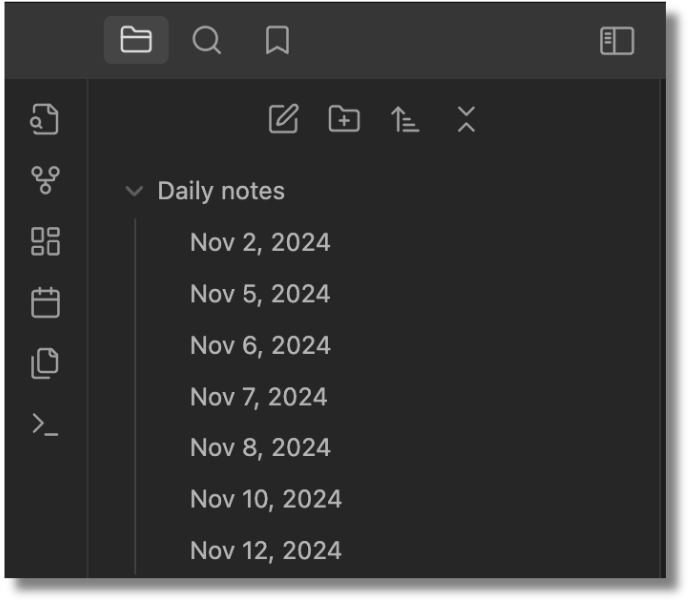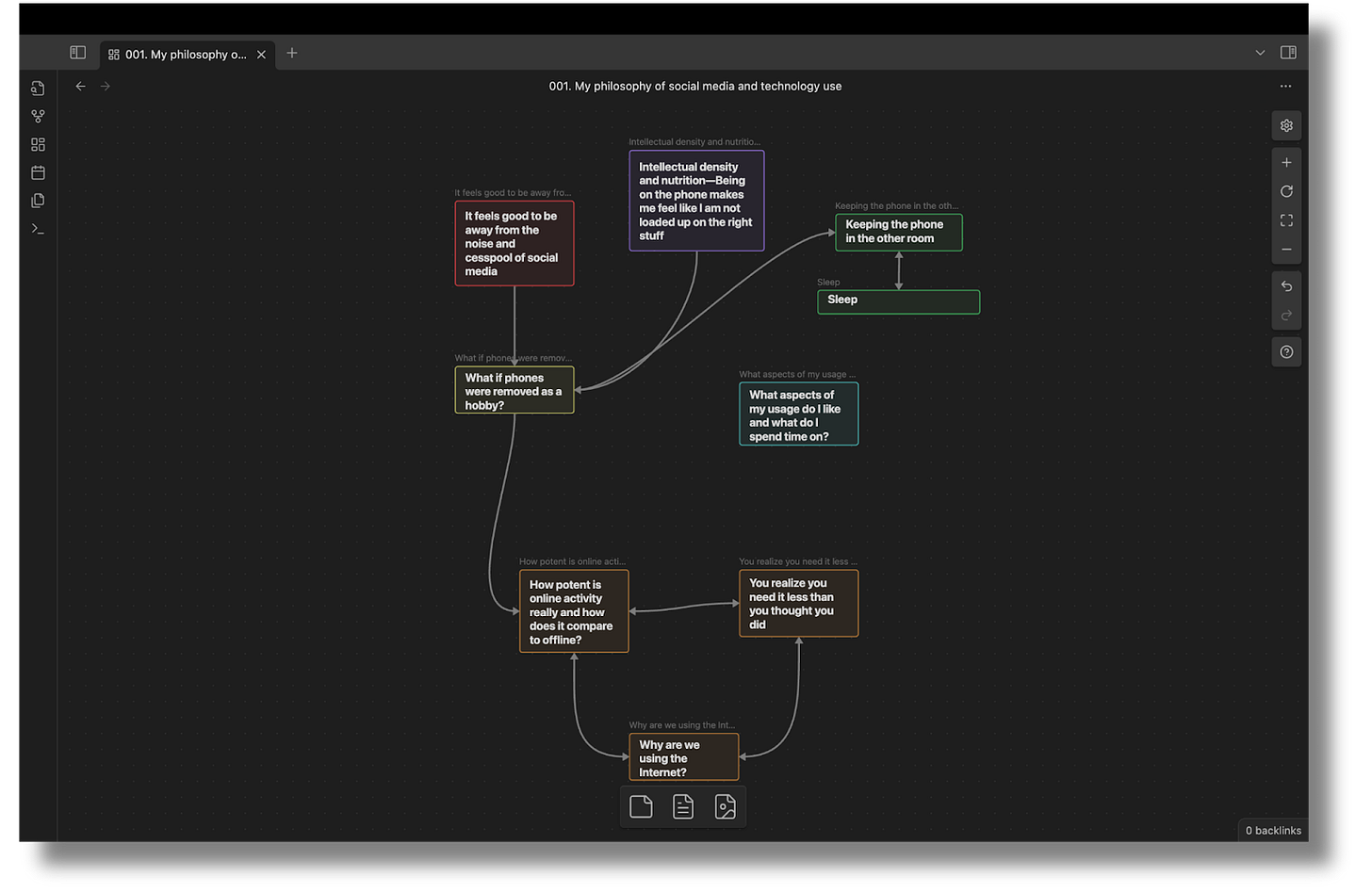Writing your way to an aspired, transformed self
Decisions of effort, Obsidian and crafting your personal philosophy

“Man is condemned to be free,” Jean-Paul Sartre wrote in Existentialism and Human Emotions.
If younger me had read this phrase, she would not have understood the accuracy of the word condemned. Instead, she would have scoffed at the notion that freedom could be anything but desirable and aspirational. Now, older and with more experience of the consequences and responsibilities of independence, I can’t help but agree with Sartre—once thrown into the world, you are responsible for everything you do. Freedom is an exhilarating weight to carry.
This year, in particular, has been about seeking clarity and coming to terms with the freedom I have: now that immigration has been taken care of, what kind of life do I want to build in Canada? Thanks to the layoff, which direction do I want to take my work in? What are my thoughts about motherhood, and do I want to be a parent one day? How do I spend all this time at my behest so I can steadily create and realize my most ardent dreams?
These are big questions. Answers to them don’t appear after an afternoon of thinking and journaling. Instead, they unfurl—over days, months, sometimes years—and gain depth and dimension because of their unfolding nature.
Earlier, I used to journal1 and discuss my thoughts about some of these big questions with others. The process was haphazard, mostly internal and had a vaporous quality. It made my head hurt and my insides feel like they were reaching for something that wasn’t quite graspable.
Writing every day this year has reignited not only my love of writing, but it has also reminded me of the grounding and calmness that comes with steadily putting one word after another.
My thinking slows and simmers in itself. Thoughts condense and are poked for their veracity. When I try to join them in sentences, the bonds between them are tested for soundness. Other viewpoints are considered to measure the strength of my argument.
And so, it seemed like the natural next step: why not employ writing and its elemental mechanics in figuring out how to carry the daunting yet thrilling weight of my new freedoms?
But first, a distinction
Looking at the questions I am grappling with, I see a difference in the type of decisions I am trying to make.
Generally speaking, one category is made of decisions that can change your state of being in a fell swoop (being a parent, moving to France, trying psychedelics, &c). I call these ‘decisions of divide.’ They draw a line in the sand and create a before/after effect in your life.
The second category involves decisions that involve altering your behaviour and habits to achieve and maintain the new state of being (being a writer, a healthy person, deeply in love with your spouse, &c). These are ‘decisions of effort’ where the choice has to be made again and again—most likely every day.
This essay is about how writing can be used to support the second type of decisions2.
Writing to think outside my mind
My recent attempts at defying the allure of my phone had given me a glimpse into what decentering phone usage could look and feel like. However, two weeks of emotional and logistical turmoil in October showed me that I was still susceptible to the glow and siren call of the screen.
Turns out, phone usage was not a decision of divide. It could be for some people, I suppose, but for me, it was an everyday choice to prioritize certain things over the promises of the slot machine in my hand.
Dealing with it at the level of behaviour would not cut it; I needed to go deeper. If healthy choices had to be made every day, then they needed to have strong roots that were ideally entwined with other values and areas in my life. I needed to construct a value system about technology usage—a philosophy of sorts—that would support the habits and behaviours I wanted to be natural for me.
i.
So, I began freewriting and jotting down the thoughts, feelings and observations I had as I moved about the day. Like Didion, “I don’t know what I think until I write it down,” so I opened up the endless white expanse of an on-screen document to learn what I thought beyond momentary impressions and flashes of reactions. Here is a sampling:
“My Internet usage has been a way to not accept the limitations of my environment. To go beyond it and make my world feel bigger than it is. I am curious about the world and want to know what’s happening. Social media makes me feel not limited.”
“I feel polluted after extended browsing. Sickish like you get after eating lots of junk food or binge-watching. Does not feel good.”
“My phone stays in the kitchen now—for the past three days at least I think. And my God. Such a difference it makes. I don’t need it around me. That’s what I realized. You can do so much more stuff if you don’t have it around you. You can focus. You can even forget about the phone! And then you find that there is nothing much to do on it anyway. What the fuck was I wasting my time on there for?!”
Freewriting and taking intermittent notes throughout the day is also a wonderful way to make something a ‘trending topic’ for yourself. Instead of checking what other people are saying about #socialmedia&technology, I check my responses to it and capture them gradually in bits and pieces—a great way to develop and concretize self-awareness.
After freewriting for ten days, I had a sense about the general tenor and direction of my thoughts. It was time to switch gears and platforms.
ii.
From the plain, infinite document, I transferred all my disjointed thoughts to Obsidian, a free, off-the-cloud (!!), note-taking software, whose black-and-purple-colored icon is aesthetically precise and livens up the dock on my Mac.
mentioned using it in his newsletter Escaping Flatland and I have been slowly tinkering with it since last month.The software’s main power is the ability to function as your personal knowledge base that can be adapted to your thinking. You can create notes and cross-link + backlink them3 to each other, thereby designing your own personal Wikipedia. For constructing my value system, I used it a little differently.
The raw material of my free-write thoughts was organized by date. So, I created a note in Obsidian for each date I had material for and grouped them in a folder:
The purpose of migrating from Google docs to Obsidian was to tease out the reigning themes in my thinking. Were there throughlines in my thoughts about social media and technology usage? If yes, what? In the canvas space, I arranged and connected the notes over and over as I found, labelled and coloured the unifying themes amongst them:
At this point, I want to point out how neat it is to see my thinking and its interconnections like this.
There is nothing vaporous and insubstantial—my thoughts and responses are outside my mind where I can clearly name and look at them. The threads and arrows connecting the notes tell me that I have repeatedly thought about sleep, sanity and keeping the phone in the other room; intellectual density and nutrition; and re-imagining hobbies and how I spend time.
iii.
The next step is assessment, and for that, I created new notes that centred around the themes I had uncovered in my web of thinking. One more rewrite where I tightened the titles of the themes gave me this:
Looking at the canvas, I can see clearly that there are some things I haven’t considered because I started thinking in the ‘middle of things’ so to speak. Some of them are:
Why do I care about this so much? (The themes tell me what I think about most often, but I want to answer why I even started this process in the first place).
What do I count as okay and absolutely wasteful phone usage?
What are some compelling insights by others on this topic—both for and against—and what can I glean from them? (At this point, I am open to considering other viewpoints to enhance and expand my lines of thought).
Notwithstanding the gaps, by now I have a solid foundation for my value system. Best of all, my reasons and actions are rooted in authentic experience. They are linked with other areas of my life, which increases their overall strength in affecting my behavior when it comes to phone usage.
For example, intellectual density and nutrition is something that, while it came up here, is an area I care about outside the context of technology. My thinking about this has been diffused, but now that I have named it, I am better able to pick out realizations regarding this topic:
Both content quality and medium play a role in the intellectual value I get from a piece. Hence, paper > laptop > phone. I now print my favourite articles off the web instead of re-reading them on a screen.
This is a crucial value for me because it has a direct impact on my writing.
Learning and chewing over new things makes me feel invigorated and hopeful, so I make it a point now to not miss my post-mealtime reading sessions.
These reasons and preferences feed back into how I decide to use technology, creating a two-way cascading effect.
One of the most important features of this process is that it is not meant to be completed in a predetermined block of time.
By letting it unfold over days and weeks, your thinking has a chance to interact with itself, with life and then again with itself. Insights can percolate and perspectives can take root as they are revisited and refined. Through this dance of writing-living-reflection, you imperceptibly begin living the value system you were constructing. Your beliefs and actions naturally fall into step.
Since the timing of such a thing cannot be determined, the process doesn’t have a definitive finish line. It is meant to provide support in making decisions of effort in such a way that the decision-making and effort decrease or altogether vanish—and you are left standing as the person you aspired to be.
I am still freewriting and noticing the themes in my thinking. At some point, I will coalesce and distill all the notes and connections into an essay (or a series of essays maybe). It will be like my personal manifesto—my guide to navigating technology with conviction in a healthy and highly authentic manner.
Freedom managed 🪄
Are there any practices, systems or schools of thought you swear by for making change happen or making big decisions? I would love to hear about and potentially integrate them into my process.
I still journal every day but that is to write, vent and observe chaotically with little care for making sense. Basically, I remove the crusty, upper film of my thoughts so the good stuff from the lower and back layers can easily come to the forefront.
There are many more ways of categorizing decisions but this is my (elementary) method for now. For me, decisions of divide and decisions of effort are both big decisions, though, this interesting paper by Edna Ullmann-Margalit would disagree with classifying the latter as such: https://fas-philosophy.rutgers.edu/chang/7Ullmann-Margalit_Big%20Decisions_2006.pdf
I really liked (and agreed with) how a Reddit user described the software: “It's a model for thinking. Obsidian encourages me to link rather than organize, so I don't have to think about hierarchies while I'm absorbing information. Smaller notes that link together, and you can naturally travel across your knowledge without defining boundaries. This is optional, by the way — you can still write long notes, build a folder structure, and even create multiple vaults for different areas of your life. But I think it's more organic to just collect everything into a central web.”







Thanks for sharing this thoughtful piece, Esha. I love it when technology intersects and reinforces creativity in this way. Your method is so systemic and organized! It just makes me think that writing can be so many things – artistic, scientific and practical. Looking forward to reading any essays that might emerge from connecting the dots – that is, if you choose to share it in the future. Either way, your approach of noting down your thoughts in such a structured manner is very inspiring!
Did I just finally find a method to make all of my overthinking make sense? This was such an insightful piece. I usually journal thoughts about specific things but have never thought about freewriting. Trying this immediately!